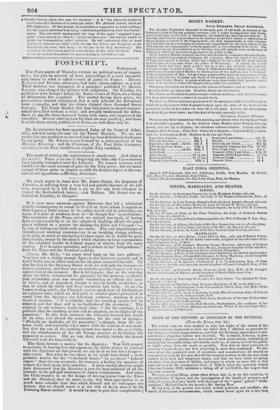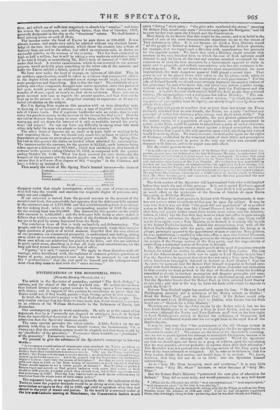STATE OF THE COUNTRY AS INDICATED BY TIIE REVENUE.
[Front the Times, Oct. 12.1
The casual view we were enabled to take last night of the return of the quarter's tecenue impressed tts with the belief that it afforded no grounds for any thing like honest congratulation, 711141 that the flattering appearances it pre- sented were altogether hollow and deceitful. We hesitated, however, at pro- nolincing a duci■ive opinion on a document of such great extent, embracing so many points of consideration, and artfully made up, of course, to lead the public as much astray from the truth as possible. Now that we have had time to eximine it more closely, our first misgiving is more than confirmed. We dis- cover what the paral■zell state of commerce and manufactures all around us convinced us must be the case, that all the assumed increase in the revenue arises entirely front local and temporary causes, and that we have made no spring whatever from that state of debility and torpor in which we were left at this time last year by the commercial crisis of 1936-7, when the quarterly return (that fur Oetober 1137) exhibited a falling off of 1,197,000L, the largest that has ever (teem red.
We have no great liking, unless when driven into it, as on this occasion, to the exhibition of figures, and the investigation of the details of accounts, and therefore, deal very briefly with that part of the " great" police!" arith- metician," Al Whael Cassto the second—Mr. Spring Rice. lie has had, in the quarter just ended, several godsends and windfalls, the result of fortuitous circumstances, which cannot occur again fur a very long time, and which ate of sufficient magnitude to absorb his "surplus," and leave his return the counterpart, and nothing better, than that of October, 1837, generally designated in the city as the "disastrous" return. We shall bestow a brief passing notice on each of these. The increase under the head of Excise be puts down at 388,492/. It was already known, and might very safely be inferred without any absolute know- ledge of the fact, that the coronation, which threw the country into a blaze of festivity from one end to the other, had added an enormous sum, in duties ou exciseable articles, to the revenue of the ccuntry. This has been estimated as high as half a million, but it will be taking a very moderate calculation haired if we take it simply as neutralizing Mr. Rice's item of increase of "388,4921." under that head. A stricter examination, which is not essential to our present purpose, would probably place something on the other side of the account, aud snake the Excise exhibit a deficit, instead of a surplus. We have next under the head of stamps, an increase of 129,224/. This, so an ordinary apptehension, would be taken as evidence that cointnereial affairs, in the degree which such an extended use of stamps would imply, had become more plosperous and floutishing. But is this the case ? The multitude of new railway and other companies, brought into active operation since this period of last year, would produce an additional revenue, by the stamp duties 00 the transfer of shares, equal, or nearly so, that above set down. 11 hew aids are in treat measure new ones as regards the present quarter, awl that they can be acept up to the present scale is altogether contrary to experience or to any ra- tional calculation on the subject. But Yr. Spring Rice treats on this occasion with an item altogether new, as figuring in an account of revenue—viz., a sum of 65,000/. produced by the sale of Crown lands. But if a private landholder sells an estate, does lie ever ,carry tl.e purchase-money to the account of his income for that year? Does he not rather stauvest that money in some other form, whether in the funds or on mortgage, and set down the interest of it only as available toward his yeady ways and means ? No one can have any difficulty in saying what fate must .ultimately befal the man who adopts so improvident a course !
The other items of increase are so email as to leave little or nothing to be said respecting them. But we should very much like to know to which of the depaitment accounts we are to place another great windfall. Mr. Spring Rice has had in this quarter the duties on bonded wheat admitted for consumption. The increase under the customs, for the quarter is 33,155/., such increase being taken against a deficiency of 917,000/., which was exhibited on that branch of revenue in the quarter ending October 10, 1837, as compared with the quarter ending October 10, 1536. What has been received tor corn duties ouly the keepers of the accounts and the master juggler can tell, but it is quite safe to resume that it will more than dispose of this " surplus " in the Customs, and leave a deficier cy instead of it.
Thus neatly the whole of Mr. Spring Rice's boasted increase—the items of f Customs 33,I55
Excise 338,01 Stamps 129,224
Crown Lands 65,000
In all X615,471
disappear under that simple investigation, which any man of common sense, who will take the trouble and exercise the requisite degree of patience, may carry out and complete. If our attentiuh is turned from the general account to the account of the consolidated fund, this remarkable fact appears, that the deficiency bills amount to the enormous sum of 4,776,000/. and this notwithstanding there is nit charge for the sinking fund ; while in the corresponding quarter of 1837 the charge for the sinking fund was 302,000/. The interest for this quarter on the public debt amounts to 4,835,000/. ; and the deficiency bills being as above stated, it follows that within a mere tilde the whole of the dividends to the public credi- tor are to be paid by money borrowed from the Bank. The conclusion from all this is truly melancholy and disheartening. The people, and the Pat liament by whom they are represented, waste their energies upon questions of party or of trivial moment, forgetful that the very element of our greatness, our commercial prosperity, is undermined and sinking, pining away under an incurable atrophy, through the incapacity or the indifference of those men whom our misfortune has placed at the helm, and who are indebted to party spirit alone, absorbing as it does all truly great considerations, for the long and fatal tenure tenure they have had of olfice. " Figures," it is said, " cannot err." We apply to them therefore with ad- vantage, when bewildered with the sophisms of common political questions or topics of party, and perhaps a lesson may hetwe he conveyed to our friend the " arithmetician," that the real peril to himself atid his culleagues must arise when they come to deal with the " exact sciences."



























 Previous page
Previous page